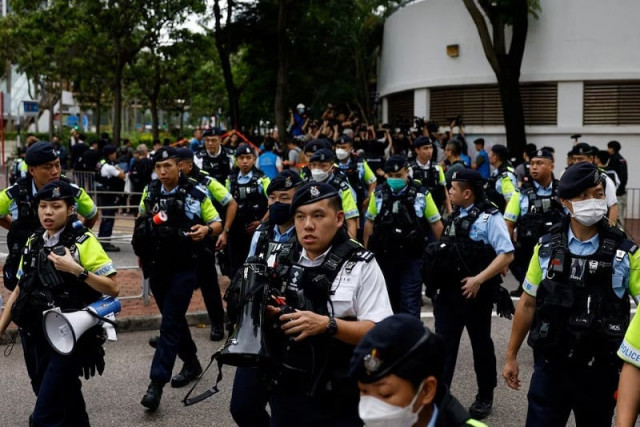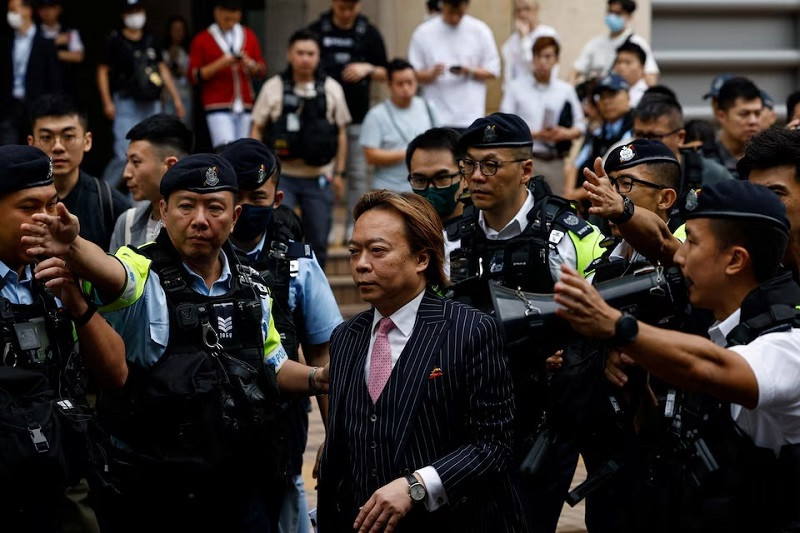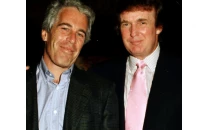‘Hong Kong 47’ trial: 14 democrats found guilty in landmark subversion case
Sentencing will come at a later date for those found guilty, with prison terms ranging from three years to life

Fourteen Hong Kong pro-democracy activists were found guilty and two were acquitted on Thursday in a landmark subversion trial that critics say could deal another blow to the city's rule of law and its reputation as a global financial hub.
The verdicts in Hong Kong's biggest trial against the democratic opposition come more than three years after police arrested 47 democrats in dawn raids at homes across the city. They were charged with conspiracy to commit subversion under a national security law imposed by China.
Sentencing will come at a later date for those found guilty, with prison terms ranging from three years to life. Thirty-one defendants pleaded guilty, and four of them have become prosecution witnesses.
The U.S. and some other countries have criticised the trial as politically motivated, calling for the accused to be immediately released. Diplomats from several countries including Britain and the European Union attended the hearing.
"Australia has expressed our strong objections to the Hong Kong authorities on the continuing broad application of national security legislation to arrest and pressure pro-democracy figures," Foreign Minister Penny Wong said in a statement.
She said her government was "deeply concerned" with the verdicts and would continue to seek consular access to Gordon Ng, an Australian citizen and one of those convicted.
'Vicious plot'
Security was tight around the High Court, with scores of police officers, some with dogs, and vehicles patrolling the area. Some supporters queued overnight to secure a spot.
"I came because it's a critical stage and a historic moment" for Hong Kong, said a man who gave only his surname, Chiu, 35, who began waiting at midnight. The defendants "all stood up for themselves and for Hong Kong people hoping to make a change".
The defendants are accused of a "vicious plot" to paralyse government in the former British colony and force the city's leader to resign through a pre-selection ballot in a July 2020 citywide election. The democrats maintain it was an unofficial attempt to select the strongest candidates in a bid to win a historic majority in Hong Kong's legislature.
Summarising their verdict, Judges Andrew Chan, Alex Lee and Johnny Chan wrote that if the defendants had succeeded, it would have created "a constitutional crisis for Hong Kong" and led to "serious interfering in, disrupting or undermining the performance of duties and functions in accordance with the law by the (Hong Kong) government."
Several defendants, including activists Owen Chow, 27, and Gwyneth Ho, 33, appeared stony-faced in the dock as the verdicts were delivered to a packed courtroom.
Read also: New Hong Kong law introduces life imprisonment for treason, insurrection
Those convicted also include former democratic lawmakers Leung Kwok-hung, Lam Cheuk-ting and Helena Wong. It was not yet clear whether any would appeal.
Leung, 68, is the oldest defendant.
"Although he might not be well emotionally and still not yet adapted to prison life... he always told me that he's innocent," Leung's wife, Chan Po-ying, told Reuters before the verdict.
Chan and three other activists were arrested outside the court for trying to stage a protest. An official later said they had been engaged in "disorderly conduct".
'Ruthless illustration'
Acquitted were barrister Lawrence Lau and social worker Lee Yue-shun.
"There are still other defendants in this case warranting our concern and even love," Lau said outside the court.
Prosecutors said they planned to appeal the two acquittals. The judges extended bail for those two and tentatively adjourned the case until June 25, when those convicted are able to make mitigating arguments before final sentencing.
Mass pro-democracy protests erupted in Hong Kong in 2019 against Beijing's plans for legislation that democrats argued infringed on freedoms guaranteed when Hong Kong returned to China's control in 1997.
Beijing in 2020 imposed the sweeping national security law that led to a spate of arrests of democratic campaigners as well as the closures of liberal media outlets and NGOs. Hong Kong's democratic opposition had sought for decades to pressure Beijing to allow full democracy in the city.

Lawrence Lau Wai-chung is escorted by police outside the West Kowloon Magistrates' Courts building after being acquitted of charges under the national security law, in Hong Kong, China, May 30, 2024. PHOTO: REUTERS
Once-lively street marches, demonstrations and vigils have essentially ceased amid intense policing.
"This unprecedented mass conviction is the most ruthless illustration yet of how Hong Kong's national security law is weaponised to silence dissent," Amnesty International's China director, Sarah Brooks, said in a statement. "It represents a near-total purge of the political opposition."
Beijing says the national security laws have brought stability to Hong Kong and that human rights are respected.
Most of the accused have been detained since Feb. 28, 2021 and went through marathon bail hearings.
Those who have pleaded guilty include former law scholar Benny Tai, whom the prosecution called a "mastermind" of the "conspiracy", and activist Joshua Wong.



















COMMENTS
Comments are moderated and generally will be posted if they are on-topic and not abusive.
For more information, please see our Comments FAQ